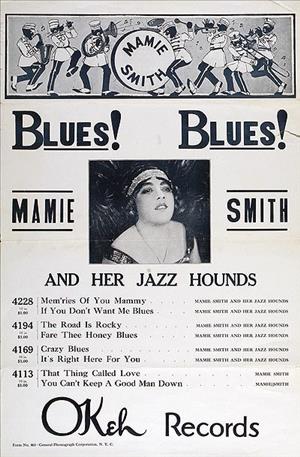On Sunday evening, May 6, 1923, longtime vaudevillian Mamie Smith (1883-1946) makes her Seattle performance debut at the city's grand Metropolitan Theatre in a big-time touring revue titled "Struttin' Along." Smith's recording of "Crazy Blues" back in 1920 became a huge sales hit and made her a historic figure as the first black vocalist to record a blues-related song.
Struttin' Along
Advance promotion began on April 29, 1923, when The Seattle Times published a large display ad hyping an upcoming show at the Metropolitan Theatre at 4th Avenue and University Street. This great theater had been erected in 1911 on the former site of the Territorial University in downtown Seattle. (The Olympic Hotel would open on the same block in 1924, and with expansions eventually wrap around the theater, which survived until 1954).
According to the publicity, "Struttin' Along" was directed by Ackerman and Harris and would have a five-night run -- with one additional "Big Jazz Dollar Matinee" show on Wednesday, May 9 ("5 Nights ..."). Ads offered attendees "Something New! Something Different! -- The Speediest, Peppiest, Breeziest, Funniest Musical Revue San Francisco Has Seen in Years," with a company of 75 performers, including a "Creole Beauty Chorus," Rucker and Perrin's "A Blackberry Cordial in Two Swallows," and "The World's Greatest Dancing Show," with Mamie Smith and her Jazz Hounds ("Next Week").
The Seattle Post-Intelligencer noted in the language of the time that "Struttin' Along" featured an "all-colored cast" that would provide "one of the sprightliest shows Pacific Coast audiences have ever known. Jazz music, droll songs, swift dancing, and comic episodes, are said to be entertainingly mixed in this novel offering" ("Novel Show ...").
Opening Night
The Sunday of the show's opening performance, a Metropolitan Theatre display ad appeared in the Times boasting of "A veritable bombardment of jazz, lightning dancing, irresistible mirth, music, melody, direct from 8 week's run at the Century Theatre, San Francisco. STRUTTIN' ALONG -- World's Greatest Dancing Show -- with Mamie Smith and Jazz Hounds" ("5 Nights ..."). Next to the ad, the paper published an article headlined "Negro Players Here -- Appear at Metropolitan in 'Struttin' Along,'" which reported that "The tide of all-colored entertainments that has been overwhelming Eastern centers of culture will reach this city tonight, when Mamie Smith brings a company of seventy-five dusky singers, dancers and comedians to the Metropolitan Theatre" ("Negro Players Here").
The next day, the Times published a review of the revue:
"Brothers and sisters of jazz -- sixty or more of them -- strutted their stuff at the Metropolitan last night to the continuous amusement of an audience that filled the theatre. The black and tan revue ... is ... a lively, noisy entertainment. ... Last night's audience was most receptive and the various features of the revue kept the entertainers on their mettle. Mamie Smith and her seven 'jazz hounds' were given prominence in the revue and the colored star who makes records for talking machines was warmly received, while her orchestra lived up to its reputation for jazz" ("Struttin' Makes Hit").
The Post-Intelligencer also ran a review, which offered further details about the debut performance:
"Brisk entertainment, swift moving, picturesque, spontaneously humorous, enlivens 'Struttin' Along.' ... Dancing, jazz, old songs and new, vivid ensembles, and genuine Afro-American humor are adroitly mingled by these merrymakers ... who 'put over' their offering in a style that is both original and pleasing. ... [One] highlight of the entertainment is the singing of Mamie Smith who, accompanied by her 'jazz houns,' interprets 'You've Got to See Mama Every Night,' and 'Don't Mess With Me,' in a way to win the kind of applause that can only be answered with an encore" ("Novel Revue Is Rich in Humor").
Picture This
While in Seattle, Smith and her co-performers had their photographs taken at the studios of the Cress and Dale Company, located in the Crary Building at Fifth Avenue and Union Street downtown. John D. Cress and L. R. Dale had been providing images to The Seattle Times since 1919 and would continue to do so into 1924, when they dissolved their partnership.
Along the way, the newspaper published Cress and Dale's photographs of everything from a war-bond rally to a caravan of Detroit Electric cars driving up to Paradise Inn on Mount Rainier and giant Douglas fir trees being logged by the Snoqualmie Falls Lumber Company mill. In addition, they photographed cultural phenomena and events, including Seattle's Ladies Musical Club, Russian opera great Feodor Chaliapin's performance at the Moore Theatre, the famed boxer Jack Dempsey at the Pantages Theatre -- and in May 1923 the legendary Mamie Smith.

